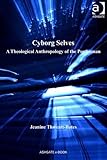Cyborg selves : a theological anthropology of the posthuman / Jeanine Thweatt-Bates.
Material type: TextSeries: Ashgate science and religion seriesPublisher: Farnham, Surrey, England ; Burlington, VT : Ashgate, [2012]Copyright date: ©2012Description: 1 online resource (xii, 212 pages) : illustrationsContent type:
TextSeries: Ashgate science and religion seriesPublisher: Farnham, Surrey, England ; Burlington, VT : Ashgate, [2012]Copyright date: ©2012Description: 1 online resource (xii, 212 pages) : illustrationsContent type: - 9781409421429
- 1409421422
- 9781409421412
- 1409421414
- Theological anthropology
- Philosophical anthropology
- Human evolution
- Human beings -- Forecasting
- Cyborgs
- Anthropologie théologique
- Anthropologie philosophique
- Êtres humains -- Évolution
- Êtres humains -- Prévision
- Cyborgs
- philosophical anthropology
- RELIGION -- Christian Theology -- Anthropology
- Cyborgs
- Human evolution
- Philosophical anthropology
- Theological anthropology
- 233 23
- BL256 .T55 2012eb
- online - EBSCO
| Item type | Current library | Call number | URL | Status | Notes | Barcode | |
|---|---|---|---|---|---|---|---|
 eBook
eBook
|
Biblioteca "Angelicum" Pont. Univ. S.Tommaso d'Aquino Nuvola online | online - EBSCO (Browse shelf(Opens below)) | Online access | Not for loan (Accesso limitato) | Accesso per gli utenti autorizzati / Access for authorized users | (ebsco)444346 |
Browsing Biblioteca "Angelicum" Pont. Univ. S.Tommaso d'Aquino shelves, Shelving location: Nuvola online Close shelf browser (Hides shelf browser)
Includes bibliographical references and index.
The cyborg manifesto -- The transhumanist manifesto -- Post-anthropologies -- Theological anthropologies -- Constructing a theological post-anthropology -- Christology and the posthuman.
Print version record.
What is the "posthuman?" Is becoming posthuman inevitable-something which will happen to us, or something we will do to ourselves? Why do some long for it, while others fearfully reject it? This book aims to clarify current theological and philosophical dialogue on the posthuman by arguing that theologians must pay attention to which form of the posthuman they are engaging, and to demonstrate that a "posthuman theology" is not only possible, but desirable, when the vision of the posthuman is one which coincides with a theological vision of the human.









